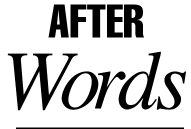The Rochester Review, University of Rochester, Rochester, New York, USA
![]()


Bob Ludwig '66E has lent an ear to some of the biggest names in music.
Green Day, Tori Amos, Bruce Springsteen, Eric Clapton, and dozens of other headliners entrust their life's work to the man who may well be the most sought-after disk master around.
For the uninitiated, Ludwig's profession--known as mastering--is, in his words, "the last creative step and the first manufacturing step" in producing a musical recording.
It's his job ("in a very, very short time") to get to know the music, develop a feel for how the final product should sound, and gently add the finishing touches. He does this electronically, tweaking the controls on his studio equipment as he listens--very carefully--to coax the most musicality out of the original tape.
Each recording has a personality as unique as its performer; it is Ludwig's task to bring that to the fore--while eliminating the "ticks and pops," those extraneous noises that don't belong.
"Sometimes before I even start I can hear a record and visualize how it should sound," he says. "I know what knobs to turn to make it sound like what's in my head."
Ludwig's talent is downright magic to the growing number his clients who take the "do-it-yourself" route and record their music on low-resolution monitoring speakers in their basements and garages. But he fine-tunes plenty of studio-recorded work, too; even the most expertly engineered recording can use a final polish.
And polish he does, tucked away in his studio in Portland, Maine, surrounded by some of the most sophisticated electronic equipment around. When five years ago he moved from New York to be nearer to family, he figured business would drop by about 80 percent and that few of the musicians attending his New York sessions would hop a plane to Maine to do the same.
Guess what? Ludwig got busier.
Musicians take the Portland trip "as a mini-holiday," he says. "Very often they'll spend a day or more here just touring the area and relaxing." Springsteen, it is reported, was sighted pumping iron at the local health club, and Clapton, who has publicly renounced British beef, was spotted savoring an American burger at a neighboring eatery.
In his 30-year career Ludwig has worked with everyone from Peter, Paul and Mary to The Band to Shawn Colvin. (He built his reputation at A&R Records, Sterling Sound, and Masterdisk--the last for 17 years--before striking out on his own as founder and president of Gateway Mastering.)
"I was just this young pup starting out," Ludwig says of the time he worked with Jimi Hendrix on Electric Lady Land. "He actually seemed concerned about whether I liked his music or not."
The industry, he adds, was "so much more fun in the '60s and '70s than it is now."
Nothing could beat the fun back then of mixing a single that went on to be a hit. (In those days, record companies typically cut singles; if one of them caught on, an album followed.) But gradually the energetic, entrepreneurial record labels merged into nicheless conglomerates, he says, and "everything got homogenized."
Even though the business has changed, Ludwig's role has not. He likes being part of the creative aspect of an album--taking a raw tape that the artist has given him and bringing out enhancements in the sound that often even the artist didn't think were possible.
That ability has earned Ludwig numerous honors. He has won seven TEC awards for technical excellence and creativity in Mix magazine's annual competition. (In 13 years, only one other person has ever won it.) He also received the first Les Paul Award--ceremonially handed to him by the legendary guitarist himself.
And at the most recent Grammys, 24 recordings he had mastered were nominated for a total of 30 awards. Before long it is likely he'll be scarfing up Grammys in his own name. It seems that mastering may soon be recognized as a Grammy-worthy art on its own. In that case, we have a nominee to mention. . . .
"He was a breath of fresh air in so many ways," recalls Robert Morris '65E, who knew Ludwig when they were fellow students at Eastman, where Morris now teaches composition and theory. "Bob had very broad tastes, but not without a great amount of discernment. He was totally, passionately involved in the music of other cultures. That was one of the reasons we hit it off: We both liked Indian music."
Ludwig, at the time a trumpet-playing music education major, already displayed a talent for hearing qualities in a wide range of music, Morris says.
"You hear about musicians having perfect pitch, but there's another ear for sound, and that is orchestration. That's Bob. He can hear those little sounds that others cannot, and he can sense how all the sounds best blend together."
Ludwig--who at age 8 was lugging around a tape recorder producing home-grown shows in collaboration with his sister--worked part time in his student years recording recitals and playing classical music at an FM radio station. He was pursuing an advanced degree at Eastman the day record producer Phil Ramone came to the school to conduct a workshop on recording.
When he left, Ramone offered Ludwig, his de facto assistant for the event, a job as an apprentice at his A&R studio in New York. And that, it turned out, was that. The future master mind had found his career.

BOB LUDWIG '66E
1998: Disk Master to the Stars
1966: An Ear for Sound
Sally Parker

Maintained by University Public Relations